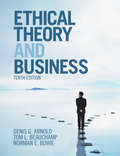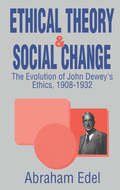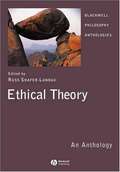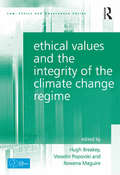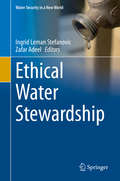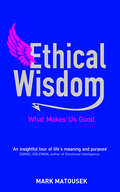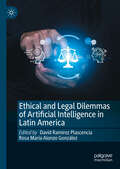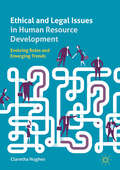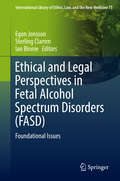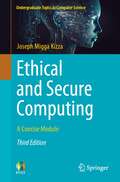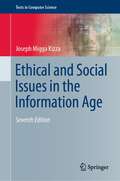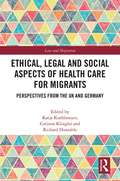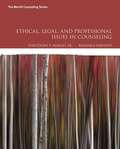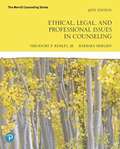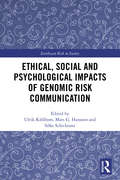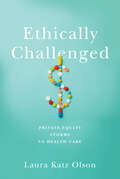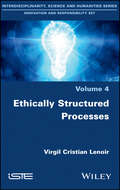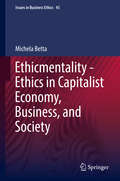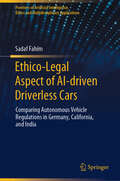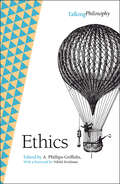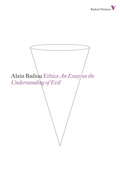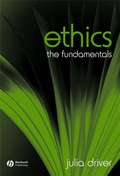- Table View
- List View
Ethical Theory and Business: International Edition (Mythinkinglab Ser.)
by Tom L. Beauchamp Denis G. Arnold Norman E. BowieFor forty years, successive editions of Ethical Theory and Business have helped to define the field of business ethics. The 10th edition reflects the current, multidisciplinary nature of the field by explicitly embracing a variety of perspectives on business ethics, including philosophy, management, and legal studies. Chapters integrate theoretical readings, case studies, and summaries of key legal cases to guide students to a rich understanding of business ethics, corporate responsibility, and sustainability. The 10th edition has been entirely updated, ensuring that students are exposed to key ethical questions in the current business environment. New chapters cover the ethics of IT, ethical markets, and ethical management and leadership. Coverage includes climate change, sustainability, international business ethics, sexual harassment, diversity, and LGBTQ discrimination. New case studies draw students directly into recent business ethics controversies, such as sexual harassment at Fox News, consumer fraud at Wells Fargo, and business practices at Uber.
Ethical Theory and Social Change
by Abraham EdelJohn Dewey was unique among American philosophers in his insistence that the events, the social structure, the beliefs and attitudes of a period, its models of science and human history, all have some constitutive role in its philosophical theory. This belief is amply demonstrated in Dewey's own writings. Dewey and James H. Tufts' Ethics was first published in 1908 with a revised edition appearing in 1932. Dewey's part in the latter was wholly rewritten, and in effect constituted a new work, showing that Dewey did not believe ethical beliefs were eternal and unchanging. In Ethical Theory and Social Change, Abraham Edel provides a comparative analysis of the two editions to show how Dewey conceived ethics as part of an ongoing culture, not intelligible if isolated.The years between the two editions of Dewey and Tufts' Ethics were momentous in America and across the world. In 1908 industrialism was in high gear, putting greater pressure on social institutions and raising expectations of technological progress and extended democratic growth. By 1932, the devastation of World War I, economic depression, and the rise of totalitarianisms of the left and right had shattered that earlier optimism. The shift toward secular philosophy and new perspectives in research and method in the social sciences was challenging established universalizing views of morality with perceptions of fundamental moral conflict and the threat of relativism in their resolution.Dewey, is an ideal case for comparing changes in ethical theory over a quarter century. Unlike many philosophers he appreciated change and many of his basic ideas are geared to the problem of human control over change. Moreover he is concerned with the relation of theory and practice, and much of his work in metaphysics and epistemology is devoted to discovering the role that doctrines in these fields play and how they reflect the movement of social life. He is constantly concerned with ethics, with the history of ethics, and with the presuppositions of ethical theories that are studied in the social sciences and applied in the normative disciplines of politics, education, and law.Dewey's project of comparison in ethics reveals how theory is crystallized in the processes of the growth of knowledge in all fields and the human vicissitudes of history. Ethical Theory and Social Change will be of interest to philosophers, sociologists, and intellectual historians.
Ethical Theory: An Anthology
by Russ Shafer-LandauEthical Theory: An Anthology is an authoritative collection of key essays by top scholars in the field, addressing core issues including consequentialism, deontology, and virtue ethics, as well as traditionally underrepresented topics such as moral knowledge and moral responsibility. <P> Brings together seventy-six classic and contemporary pieces by renowned philosophers, from classic writing by Hume and Kant to contemporary writing by Derek Parfit, Susan Wolf, and Judith Jarvis Thomson. This book guides students through key areas in the field, among them consequentialism, deontology, contractarianism, and virtue ethics. This book also includes coverage of metaethics, normative ethics, and practical ethics Reaches beyond traditional texts by also including important, but usually underrepresented, topics such as moral knowledge, moral standing, moral responsibility, and ethical particularism.<P> Page numbers included.
Ethical Values and the Integrity of the Climate Change Regime (Law, Ethics and Governance)
by Vesselin Popovski Hugh BreakeyThis book investigates the ethical values that inform the global carbon integrity system, and reflects on alternative norms that could or should do so. The global carbon integrity system comprises the emerging international architecture being built to respond to the climate change. This architecture can be understood as an 'integrity system'- an inter-related set of institutions, governance arrangements, regulations and practices that work to ensure the system performs its role faithfully and effectively. This volume investigates the ways ethical values impact on where and how the integrity system works, where it fails, and how it can be improved. With a wide array of perspectives across many disciplines, including ethicists, philosophers, lawyers, governance experts and political theorists, the chapters seek to explore the positive values driving the global climate change processes, to offer an understanding of the motivations justifying the creation of the regime and the way that social norms impact upon the operation of the integrity system. The collection focuses on the nexus between ideal ethics and real-world implementation through institutions and laws. The book will be of interest to policy makers, climate change experts, carbon taxation regulators, academics, legal practitioners and researchers.
Ethical Water Stewardship (Water Security in a New World)
by Ingrid Leman Stefanovic Zafar AdeelThis interdisciplinary book brings philosophers and non-philosophers to the table to address questions of water ethics, specifically in terms of how moral questions inform decision making around water security at local, national, and international scales.Water security, which pertains to the experience of assured access to clean water, is a broad concept that intersects human rights, politics, economics, law, legislation, public health, trade, agriculture, and energy. Decisions made at each of these intersection points have ramifications for human well being, especially for the populations that are marginalized in a societal and political sense. In this book, the ethical dimensions of decision-making at those intersection points are explored, and real-world examples are used to tease out some key insights. It charts how ethical consideration can help shape a future in which everyone will be water secure.
Ethical Wisdom: What Makes Us Good
by Mark MatousekSince the days of the first primitive tribes, we have tried to determine why one man is good and another evil. Mark Matousek arrives at the answer in Ethical Wisdom. Contrary to what we've been taught in our reason-obsessed culture, emotions are the bedrock of ethical life; without them, human beings cannot be empathic, moral or good. But how do we make the judgement call between self-interest and caring for others? What does being good really mean? Which parts of morality are biological, which ethical? When should instinct be trusted and when does it lead us into trouble? How can we know ourselves to be good amidst the hypocrisy, fears and sabotaging appetites that pervade our two-sided natures? Drawing on the latest scientific research and interviews with social scientists, spiritual leaders, ex-cons, altruists and philosophers, Matousek examines morality from a scientific, sociological, and anthropological standpoint. Each chapter features a series of questions, readings, interviews, parables and anecdotes that zoom in on a particular niche of moral enquiry, making this book both utilitarian and fun. Ethical Wisdom is an insightful and important book for readers crisscrossing their own murky moral terrain.
Ethical and Legal Aspects of Computing: A Professional Perspective from Software Engineering (Undergraduate Topics in Computer Science)
by Gerard O'ReganThis textbook presents an overview of the critically important ethical and legal issues that arise in the computing field and provides a professional perspective from software engineering. The author gained exposure to these aspects of computing while working as a software engineer at Motorola in Ireland, where he coordinated the patent programme and worked with several software suppliers. Topics and features: Presents a broad overview of ethics and the lawIncludes key learning topics, summaries, and review questions in each chapter, together with a useful glossaryDiscusses the professional responsibility of computer professionalsExplores ethics in various civilisations and religious traditionsDiscusses ethical software engineering and ethical outsourcingConsiders what is fair and ethical in data scienceDescribes ethical challenges that arise in social media and the AI fieldReviews intellectual property including patents, copyright and trademarks This practical and easy-to-follow textbook/reference is ideal for computer science students seeking to understand legal and ethical aspects of computing. The text also serves as a concise self-study primer for software engineers and software managers.
Ethical and Legal Dilemmas of Artificial Intelligence in Latin America
by David Ramírez Plascencia Rosa María Alonzo GonzálezThis book analyzes the potential benefits of using artificial intelligence to surpass traditional social and economic problems in Latin America, but it also looks to understand the perils and barriers derived from the adoption of this technology. This volume is divided in Section 1. &“Considering AI in the private sphere&” that debates about the employment of artificial intelligence from the citizen&’s perspective. It embraces topics related with the introduction of AI in the media and the labor market, and how Latin Americans perceive, engage and mobilize before the rising presence of AI in their daily lives. Section 2. Challenges and promises of AI in the public sector centers on the ethical and legal controversies triggered by the incorporation of artificial intelligence in the public sphere. It focuses on the promising benefits of introducing AI in the public administration, education and public security, but also the latent impacts on human rights.
Ethical and Legal Issues in Human Resource Development: Evolving Roles and Emerging Trends
by Claretha HughesThis book explores the role of HRD professionals in ethical and legal decision making in the workplace. While previous books have described the need for ethics in HRD, this book presents ways that HRD scholars and professionals can influence, through collaborative relationships, effective implementation of ethical policies and legal standards in the workplace. The ethical policies of an organization provide a key insight into its values, and this book shows the relationship between those values and HRD practices, such as training and development, career development, and organization development. Exploring such topics as protected classes, diversity intelligence, employee rights, and employee privacy, this book will inform HRD scholars and professionals on researching and enhancing ethical and legal decision making in the workplace.
Ethical and Legal Perspectives in Fetal Alcohol Spectrum Disorders (FASD)
by Egon Jonsson Sterling Clarren Ian BinnieThis book discusses how to deal ethically with people with Fetal Alcohol Spectrum Disorder (FASD) in the police, courts and correctional services. Ethical and legal issues associated with the deficits of individuals with a brain disorders such as FASD are surfacing more and more frequently in criminal proceedings. People with FASD often have not been diagnosed and rarely exhibit any visible evidence of the disorder. It has been argued that this invisible disability puts them in a disadvantaged position in the justice system, since the awareness of this condition is limited. The need to identify and to address FASD more effectively and the many ethical issues this raises within the context of the law is increasingly acknowledged within judicial and legislative branches, as well as in government departments, agencies and community programs that provide services to those with FASD and their caretakers and families. This is the first book to give to elaborate on ethical and legal issues of FASD.
Ethical and Secure Computing: A Concise Module (Undergraduate Topics in Computer Science)
by Joseph Migga KizzaThis textbook highlights the essential need for a strong ethical framework in our approach to teaching of and working in computer, information and engineering sciences.Through thought-provoking questions and case studies, the reader is challenged to consider the deeper implications arising from the use of today’s rapidly evolving computing technologies and ever-changing communication ecosystems.This thoroughly revised and updated third edition features revised chapters with new and updated content and hardened the ethical framework. To cope with the rapidly changing computing and telecommunication ecosystem, a new chapter, Ethics and Social Responsibility in the Metaverse, has been added. The interface between our current universe and the evolving metaverse presents a security quagmire. The discussion throughout the book is candid and intended to ignite students’ and professionals’ interest and active participation in discussions of the issues we are facing now and those likely to emerge in the near future. Topics and features—including fully updated content:Introduces a philosophical framework and tools for understanding and analyzing computer ethics in personal, public, and professional spheresDescribes the impact of computer technology on issues of security, privacy, anonymity, and civil libertiesDiscusses the security and ethical quagmire in the platforms of the developing metaverse (NEW chapter)Examines intellectual property rights in the context of computing, including the risks and liabilities associated with softwareDiscusses such key social issues in computing as the digital divide, employee monitoring in the workplace, and risks to physical and mental healthReviews the history of computer crime, and the threat of digitally facilitated bullying, harassment, and discriminationConsiders the ethical challenges arising from online social networks, mobile telecommunication technologies, virtual reality, the Internet of Things and 5G technologiesIncludes learning objectives, discussion questions and exercises throughoutThis concise and accessible work addresses the critical ethical and moral issues important to all designers and users of computer technologies. The text incorporates the latest curricula requirements for undergraduate courses in computer science, as well as offers invaluable insights into the social impact and legal challenges posed by the latest generation of computing devices and networks.
Ethical and Social Issues in the Information Age (Texts in Computer Science)
by Joseph Migga KizzaThis textbook examines the ethical, social, and policy challenges arising from our rapidly and continuously evolving computing technology—ranging from the Internet, over to the cross-platforms consisting of ubiquitous portable and wearable devices to the eagerly anticipated metaverse—and how we can responsibly access and use these spaces. The text emphasizes the need for a strong ethical framework for all applications of computer science and engineering in our professional and personal life.This comprehensive seventh edition features thoroughly revised chapters with new and updated content, hardened by the bedrock ethical and moral values. Because of the rapidly changing computing and telecommunication ecosystem, a new chapter on Ethics and Social Responsibility in the Metaverse has been added. The interface between our current universe and the evolving metaverse presents a security quagmire. The discussion throughout the book is candid and intended to ignite students' interest and participation in class discussions and beyond. Topics and features:Establishes a philosophical framework and analytical tools for discussing moral theories and problems in ethical relativismOffers pertinent discussions on privacy, surveillance, employee monitoring, biometrics, civil liberties, harassment, the digital divide, and discriminationDiscusses the security and ethical quagmire in the platforms of the developing metaverseProvides exercises, objectives, and issues for discussion with every chapterExamines the ethical, cultural and economic realities of mobile telecommunications, computer social network ecosystems, and virtualization technologyReviews issues of property rights, responsibility and accountability relating to information technology and softwareExplores the evolution of electronic crime, network security, and computer forensicsIntroduces the new frontiers of ethics: virtual reality, artificial intelligence, and the InternetThis extensive textbook/reference addresses the latest curricula requirements for understanding the cultural, social, legal, and ethical issues in computer science and related fields, and offers invaluable advice for industry professionals wishing to put such principles into practice.
Ethical, Legal and Social Aspects of Healthcare for Migrants: Perspectives from the UK and Germany (Law and Migration)
by Richard Huxtable Katja Kuehlmeyer Corinna KlinglerNumerous important issues arise in relation to the health of, and healthcare for (and by), migrants. Much commentary on the migrant crisis and healthcare has focused on the allocation of resources, with less discussion of the needs of, and provision for, migrants. Presenting a comparative perspective on the UK and Germany, this volume increases knowledge of a broad spectrum of challenges in healthcare provision for migrants. ‘Migration’ is deliberately understood in its broadest sense and includes not only migrant patients but also migrant healthcare professionals. The book’s content is diverse, with insights from healthcare ethics, healthcare law, along with clinical perspectives as well as perspectives from the social sciences. The collection provides normative reflections on current issues, and presents data from empirical studies. By informing researchers, politicians and healthcare practitioners about approaches to challenges arising in healthcare provision for migrants, the collection seeks to inform the development of adequate and ethically appropriate strategies.
Ethical, Legal, and Professional Issues in Counseling
by Barbara Herlihy Theodore P. RemleyThis authoritative resource, written by two counseling professors--one an attorney and the other an expert in ethics--explores the most difficult ethical, legal, and professional challenges in counseling in an easy-to-understand manner. Ideal for instructors who do not specialize in the topics presented, and for students who are learning about the counseling profession, Ethical, Legal, and Professional Issues in Counseling includes numerous case studies throughout not only to highlight difficult situations faced by counselors, but also to give readers the benefit of the authors' best thinking on how to resolve the dilemmas. The complex legal, ethical, and professional counseling issues are analyzed and discussed in a manner that allows counselors to resolve challenging situations as they arise in their practice. Included is practical advice on how to manage ethical and legal issues such as using technology and social media, counseling minors and vulnerable adults, counseling clients who may be suicidal or violent, responding to subpoenas; setting boundaries with clients, students, and supervisees serving as gatekeepers for the counseling profession; developing a private practice, responding to complaints, and practicing in a diversity-sensitive manner. The topics are relevant for school counselors, clinical mental health counselors, college counselors, rehabilitation counselors, marriage and family counselors, substance abuse counselors, and counselors who practice in other specialties. As a text it is appropriate for undergraduate, master's level, and doctoral level human services and counseling.
Ethical, Legal, and Professional Issues in Counseling
by Barbara Herlihy Theodore Phant RemleyEthical, Legal, and Professional Issues in Counseling walks readers through the ethical, legal, and professional challenges they will encounter in their counseling careers. It includes numerous case studies throughout to highlight ethical and legal situations faced by counselors, and it also includes the authors' best thinking and practical advice on how to resolve these situations. The book focuses squarely on the counseling profession, as opposed to psychiatry or other helping professions.
Ethical, Legal, and Professional Issues in the Practice of Marriage and Family Therapy
by Samuel T. Gladding Theodore Remley Allen WilcoxonA best-selling text rich in case studies that reflects on the unique complexities of marriage, couples, and family counseling. Developed for students, educators, supervisors, and practitioners alike, this text examines the significant classical and contemporary issues in marriage and family therapy. The text opens with a thoughtful discussion of client and therapist worldviews, value sensitive care, the ecology of therapy, and commonalities between personal and professional acculturation. Following the book's preliminary discussion, the text moves on to consider the legal, ethical, and professional issues that marriage and family therapists face each day as well as the best strategies for navigating these issues. The new fifth edition includes a number of new topics, including multicultural issues reflecting institutional oppression; boundary, competency, and liability concerns associated with technology-based client care; the significance of supervision in both skill acquisition and professional acculturation in one's early career; nontraditional family care; conflicts between legal and ethical obligations; emerging issues in MFT licensure; and ethical and empirical considerations related to evidence-based care.
Ethical, Social and Psychological Impacts of Genomic Risk Communication (Earthscan Risk in Society)
by Silke Schicktanz Ulrik Kihlbom Mats G. HanssonThis volume presents the ethical implications of risk information as related to genetics and other health data for policy decisions at clinical, research and societal levels. Ethical, Social and Psychological Impacts of Genomic Risk Communication examines the introduction of new types of health risk information based on faster, cheaper and larger sets of genetic or genomic analysis. Synthesizing the results of a five-year interdisciplinary project, it explores the unsolved ethical and social questions around the sharing of this data, such as: What is best practice in risk communication? What are the normative presumptions and ethical consequences of an increased individual responsibility for ones’ health? And how does one deal with the gap between the knowledge of risk and the lack of therapeutic options which often exist for complex diseases, such as dementia or some types of cancer? Drawing on contributions from over 20 experts in the field, this collection examines these questions from a liberal bioethics’ perspective, advocating for contextual and cultural-sensitive ethical discussions. This book will be of great interest to students and scholars of theoretical and clinical medical ethics, medical sociology, risk communication and ethics of risk, as well as professionals in clinical genetics.
Ethically Challenged: Private Equity Storms US Health Care
by Laura Katz OlsonRevealing the dark truth about the impact of predatory private equity firms on American health care.Private equity (PE) firms pervade all aspects of our modern lives. Unlike other corporations, which generally manufacture products or provide services, they leverage considerable debt and other people's money to buy and sell businesses with the sole aim of earning supersized profits in the shortest time possible. With a voracious appetite and trillions of dollars at its disposal, the private equity industry is now buying everything from your opioid treatment center to that helicopter that helps swoop you up from a car crash site. It may even control how and when you can get your kidney dialysis. In Ethically Challenged, Laura Katz Olson describes how PE firms are gobbling up physician and dental practices; home care and hospice agencies; substance abuse, eating disorder, and autism services; urgent care facilities; and emergency medical transportation. With a sharp eye on cost and quality of care, Olson investigates the PE industry's impact on these essential services. She explains how PE firms pile up massive debt on their investment targets and how they bleed these enterprises with assorted fees and dividends for themselves. Throughout, she argues that public pension funds, which provide the preponderance of equity for PE buyouts, tend to ignore the pesky fact that their money may be undermining the very health care system their workers and retirees rely on.Weaving together insights from interviews with business owners and experts, newspaper articles, purchased data sets, and industry publications, Olson offers a unique perspective and appreciation of the significance of PE investments in health care. The first book to comprehensively address private equity and health care, Ethically Challenged raises the curtain on an industry notorious for its secrecy, exposing the nefarious side of its maneuvers.
Ethically Structured Processes: Thinking World-scale Responsibility
by Virgil Cristian LenoirResearch and innovation involve knowledge in the form of effective "processes". These radically alter the relationship of men to the world and to other men. How to manage this effectiveness responsibly? The idea is to examine various possible structurations of such processes, in order to identify efficient processes that are ethical by their structure alone. The responsibility would then be to choose to achieve such objectives, instead of another that would be ethically indifferent. These achievements are tested on what appears as an extremely powerful economic dogma: the Invisible Hand. Demystifying this, by attacking what is considered its strong point, the idea of a "balance" associated with that of pure and perfect competition, and that of a Pareto-optimality attainable by this equilibrium, assumes all its Meaning if one proposes, against this neutral trial, an ethically structured process.
Ethicmentality - Ethics in Capitalist Economy, Business, and Society
by Michela BettaEthicmentality is an innovative book. It blends ethics withmentality to capture the interdependence of ethical life and social lifecreatively. The book is also innovative because of the way this interdependenceis explored. By focusing on practical ethical behavior in today's economy,business, and society, Michela Betta has advanced an understanding of ethics freedfrom the burden of moral theory. By introducing a new type of analysis thisbook also contributes to methodological innovation. Familiar issues are revisitedthrough the notion of ethicmentality. Capitalist economy is presented in termsof a mentality embedded in society, culture, and politics. Government is revealedas mentality about how to govern economically through market freedom ratherthan human rights. The rise of the financial economy is described aschallenging the traditional capitalist mentality of equal opportunities. Amoney mentality around debts and owing is perceived as having replaced credit andowning, and the rise of corporation managers as having destroyed the oldmentality of ownership. Ethicmentality shows the potential of constructive critique from economic, business, andsociety perspectives. It also breaches traditional limits by developing the ideaof ethical capital and entrepreneurial ethics. Ethical thinking is infused withthe Aristotelian notion of virtues and moderation to reflect about modern work. Ethicmentality helps us see thecomplexity of social and personal life. Given the pervasive nature of mentalityand ethics' focus on individual deliberation, ethicmentality represents their productivecombination, a new blend for ethical and social analysis.
Ethico-Legal Aspect of AI-driven Driverless Cars: Comparing Autonomous Vehicle Regulations in Germany, California, and India (Frontiers of Artificial Intelligence, Ethics and Multidisciplinary Applications)
by Sadaf FahimThis book is a comparative study of the laws and regulations involving legal and ethical issues related to Artificial Intelligence (AI), in particular for self-driving cars or autonomous vehicles (AVs). It identifies, analyzes, and points out such issues via a study of laws and regulations in India, Germany, and California, determining the legal liabilities of designer, developer/programmer, manufacturer, producer, users, or AI in the case of AVs. AV technology is being touted as one that is poised to bring revolution in the mobility ecosystem by lessening the number of accidents and by providing other benefits, such as potential to reduce traffic, increase safety and mobility, lower energy usage and generate free time. Despite having such a potential to shape and transform the future, and involvement of tech-giants like Google, Amazon, Facebook, and Microsoft, regulations around AI and AVs are still on the drawing board stage in many countries, as they grapple on how to address this issue which has both local and global players involved and affects both local and global populace. The book studies and compares the existing and evolving regulations in three different regions to bring out the lacunae, loopholes and best practices. It highlights when AI deserves legal personhood, and when it requires to be granted legal standing. It also points out the civil and criminal legal liabilities arising when AV is involved in an accident, and the ethical issues involved in the deployment of AI. The book goes beyond new regulations to analyze whether challenges and problems arising from AI technology can be addressed within existing civil and criminal laws - procedural and substantive law – or whether a sui generis law on AI technology is required. The analysis and the results showcased here would be highly useful for multi-disciplinary research on the topic. Regulators of both industry and governance would find the contents invaluable in getting a broader picture of the issues and concerns around this topic, along with policy makers would be able to come up with more effective regulations on AI and AVs.
Ethics
by A. Phillips-Griffiths Nikhil KrishnanEthical questions are often associated with practical dilemmas: questions in morality, in other words. This volume, by contrast, asks questions about morality: what it is, and to what it owes its precarious authority over us. The focus on metaethics is sustained throughout, via a wide range of philosophical perspectives. Distinguished luminaries who include R. M. Hare and Bernard Williams address keenly debated issues such as what constitutes morality in politics; the relationship between education and ethical standards; and whether or not morality can indeed be defined at all. As Nikhil Krishnan writes in his elegant Foreword, 'The plain-speaking, essayistic grace of these essays, speaks nevertheless of the possibility of moral philosophy, written with an eye to a listener, very possibly not a professional philosopher, who has the right to say, ''This is all very well, your neat little theory, but it doesn't ring true. Things are more complicated than that.'''
Ethics
by Alain Badiou Peter HallwardAlain Badiou, one of the most powerful voices in contemporary French philosophy, shows how our prevailing ethical principles serve ultimately to reinforce an ideology of the status quo and fail to provide a framework for an effective understanding of the concept of evil.
Ethics
by Julia DriverEthics: The Fundamentals explores core ideas and arguments in moral theory by introducing students to different philosophical approaches to ethics, including virtue ethics, Kantian ethics, divine command theory, and feminist ethics. The first volume in the new Fundamentals of Philosophy series. Presents lively, real-world examples and thoughtful discussion of key moral philosophers and their ideas. Constitutes an excellent resource for readers coming to the subject of ethics for the first time.
